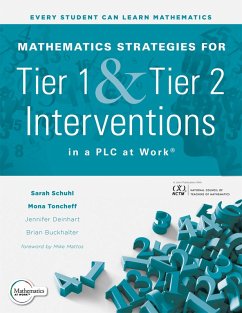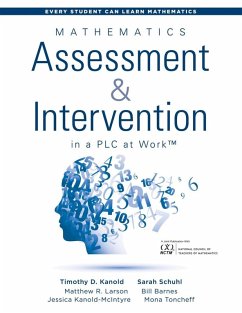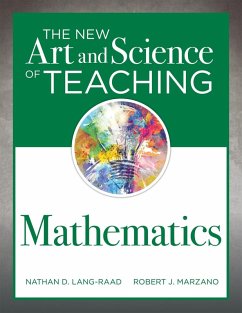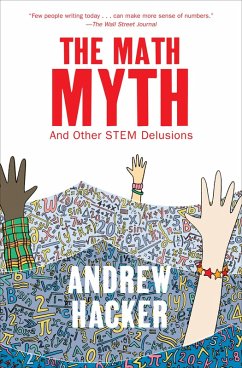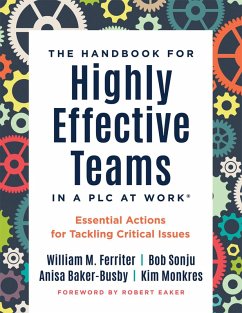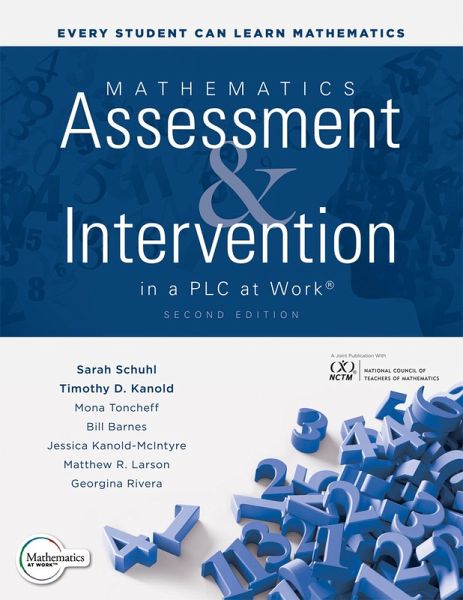
Mathematics Assessment and Intervention in a PLC at Work®, Second Edition (eBook, ePUB)
(Develop research-based mathematics assessment and RTI model (MTSS) interventions in your PLC)

PAYBACK Punkte
10 °P sammeln!
This second edition book from the Every Student Can Learn Mathematics series guides you and your collaborative teams in building student and collective teacher efficacy through the formative use of common assessments. Discover how you can work interdependently to design high-quality assessments, calibrate scoring of student work, and analyze data to enhance instructional practices and sustain effective Tier 2 learning experiences for students. New and enhanced protocols and examples provide practical tools and models for immediate implementation. Improve your mathematics collaborative team as...
This second edition book from the Every Student Can Learn Mathematics series guides you and your collaborative teams in building student and collective teacher efficacy through the formative use of common assessments. Discover how you can work interdependently to design high-quality assessments, calibrate scoring of student work, and analyze data to enhance instructional practices and sustain effective Tier 2 learning experiences for students. New and enhanced protocols and examples provide practical tools and models for immediate implementation.
Improve your mathematics collaborative team assessment processes using the four critical questions of a PLC at Work® along with an RTI or MTSS focus on effective Tier 2 interventions.
This book will help K-12 mathematics teachers and teacher teams:
Contents:
Preface
Introduction
Chapter 1: The Mathematics at Work Common Assessment Process
Chapter 2: Quality Common Mathematics Assessments
Chapter 3: Sample Common Mathematics Assessments and Calibration Routines
Chapter 4: Teacher Actions in the Formative Assessment Process
Chapter 5: Student Actions in the Formative Assessment Process
Chapter 6: Team Response to Student Learning Using Tier 2 Mathematics Intervention Criteria
Summary
Epilogue
Appendix
References and Resources
Index
Improve your mathematics collaborative team assessment processes using the four critical questions of a PLC at Work® along with an RTI or MTSS focus on effective Tier 2 interventions.
This book will help K-12 mathematics teachers and teacher teams:
- Learn the criteria for the formative use of all unit-by-unit common mathematics assessments
- Identify essential learning standards as drivers for common assessments and student reflection
- Design and use high-quality common assessments and team scoring agreements
- Calibrate the scoring of student work for consistent formative feedback to students
- Engage in data protocols that analyze student work to enhance instructional practices, identify students in need of targeted intervention or extension, and create effective intervention learning experiences
- Determine how students can reflect and set goals using the formative feedback process based on common unit-by-unit assessments
- Design and implement an effective Tier 2 mathematics intervention program to support student learning
Contents:
Preface
Introduction
Chapter 1: The Mathematics at Work Common Assessment Process
Chapter 2: Quality Common Mathematics Assessments
Chapter 3: Sample Common Mathematics Assessments and Calibration Routines
Chapter 4: Teacher Actions in the Formative Assessment Process
Chapter 5: Student Actions in the Formative Assessment Process
Chapter 6: Team Response to Student Learning Using Tier 2 Mathematics Intervention Criteria
Summary
Epilogue
Appendix
References and Resources
Index
Dieser Download kann aus rechtlichen Gründen nur mit Rechnungsadresse in A, D ausgeliefert werden.







